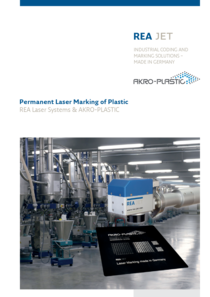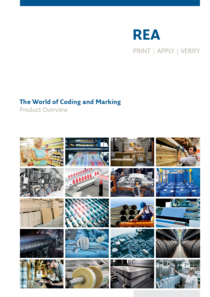Laser coding and marking solutions for plastic products
Injection-molded parts, food packaging, bags, foils and much more: a wide variety of plastic products require codes for traceability, quality assurance and consumer information. Our laser coding and marking systems do this reliably and effectively.

Customize markings individually
PLASTIC MARKING BY LASER
What is the composition of a plastic compound, what is the plastic product used for and how intensively is it used? The choice of coding and marking solution depends largely on these factors. For example, non-contact direct marking with fiber laser systems is suitable for permanent, permanent marking of injection-moulded and moulded parts for industry. Excellent marking results can often be achieved with CO2 laser systems on plastic articles made from extruded plastics such as polyvinyl chloride (PVC) and on thin plastic bags. Depending on the requirements and properties of the plastic, the laser marking can be applied by color change, foaming, engraving or material removal.
What is important for laser coding and marking solutions?
- Tailored to the properties of the respective type of plastic
- Reliable work under industrial production conditions
- Permanently durable, clearly readable markings, even on difficult surfaces
- Fast, simple and economical coding and marking technologies
- Suitability for serialization and Track & Trace
System solutions with fiber lasers are suitable for permanent, part-specific and high-contrast marking of technical plastic parts. The compound and coding and marking system have to be optimally matched to each other. During compounding, the granulate is enriched with laser-sensitive additives that enable a color change in the material during laser marking. This produces forgery-proof direct marking. As laser markers can easily reach difficult areas such as indentations and grooves on components, they are an ideal solution for complex molded and injection molded components. We have also developed a coding and marking solution with laser-sensitive additives for difficult-to-mark silicone.

Industrial laser coding and marking solutions are used throughout the plastics processing industry. Many different components and products are marked. These include packaging materials such as foils, bags and rigid plastic packaging, construction materials such as pipes and profiles, and all types of molded parts. As integrated systems, our coding and marking systems are optimally adapted to the respective marking requirements and thus support quality standards in the plastics industry.
Application examples for plastic marking
- Component marking for traceability
- Marking of plastic pipes with company logos
- Multi-colored dot and line marking for type differentiation
- Application of position and location markings
- Marking of plastic profiles usingCO2 Laser
- Direct marking of components using a fiber laser (color change)

Get an idea of the different types of marking and labeling in the plastics industry. Our laser marking solutions contribute to the quality assurance and traceability of plastic products.

In cooperation with AKRO-PLASTIC GmbH, we developed processes and materials for high-contrast markings on plastics.

Ink adheres very poorly to silicone surfaces. This is why we have developed an optimized laser marking process for the permanent marking of silicone together with our partner Merck. During silicone production, a laser-sensitive additive is mixed into the base material. The optimized energy input of the fiber laser then causes a permanent, forgery-proof color change during marking in reaction with the additive.







